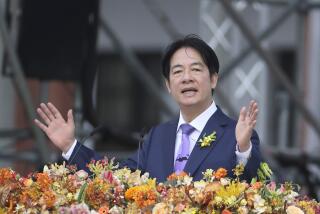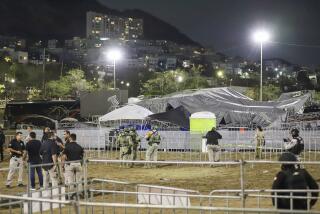Prognoses on Commonwealth: Good to Grave : Summit: After inconclusive meeting, Russians say the union is revived. Others say it is breathing its last.
Accentuating the positive, Russian Deputy Prime Minister Yegor T. Gaidar said Saturday that the collective defense agreement signed by Russia and five other former Soviet republics Friday has given the Commonwealth of Independent States a new lease on life.
But weighing the results of the Commonwealth’s one-day summit in Uzbekistan’s capital of Tashkent, other voices sounded far more pessimistic about the chances for survival of the troubled 11-nation grouping that succeeded the Soviet Union in December.
“The spectrum of prognoses on the Commonwealth is definite: from weakness to collapse,” political scientist Yuri Oleshchuk wrote in a Moscow newspaper. “And of course, the Tashkent meeting is in no position to disperse this pessimism, because never before have so many leaders boycotted the ‘summit’ of the Commonwealth.”
Significantly, even one of the presidents who did attend, Nursultan Nazarbayev of Kazakhstan, issued a plan Saturday for his country’s political and economic future that showed how far the Commonwealth has fallen in his eyes.
Long an ardent advocate of formal economic and defense cooperation among the former Soviet republics, Nazarbayev sounded markedly more cautious about the Commonwealth’s long-term prospects, saying that Kazakhstan should now shift from a policy of “integration” with the 10 other member states to one of “coordination.”
In the final analysis, Nazarbayev concluded, Kazakhstan, the largest Commonwealth member after Russia in terms of area, can count only on itself as it moves to create a multi-party democracy and a market economy.
After flying home from Tashkent, Gaidar told reporters that the “all-important result” of the summit had been the conclusion of the first post-Soviet collective security pact.
“It raises the narrower Commonwealth to another level of ties and makes it possible to say that it has a definite political future,” Gaidar said. The Tashkent accords, he said, “lay the groundwork for a new military-political course of Russia and those independent states which supported it.”
Along with Russian President Boris N. Yeltsin, the treaty was signed in the Uzbek capital by the leaders of Armenia and four of the five Central Asian republics--Kazakhstan, Uzbekistan, Tajikistan and Turkmenistan.
The pact’s key provision specifies that an act against one signatory will be regarded as an act against them all and that the parties will extend all needed assistance, up to and including military aid, to the victim.
The treaty consecrates a controlling military role for Russia by providing for supplementary agreements to deploy troops in the participating states to create a “collective security system.”
Speaking to reporters in Tashkent on Friday, an upbeat Yeltsin said he expected most of the former Soviet republics that did not sign--Azerbaijan, Belarus, Ukraine, Moldova and Kyrgyzstan--to approve the treaty soon, and he said that Russia’s ultimate goal is to “consolidate” the Commonwealth.
Some early signs seemed to justify Yeltsin’s optimism. For instance, Belarus’ parliamentary chairman, Stanislav Shushkevich, said Saturday that the Commonwealth had become “sturdier” as a result of the Tashkent talks.
Although Belarus did not sign the treaty, Shushkevich said the pact would be referred to the Parliament in Minsk for action.
The Commonwealth leader most consistently at odds with the others, Ukrainian President Leonid Kravchuk, skipped the Tashkent meeting, sending his prime minister instead, because of a visit to Kiev by Finnish President Mauno Koivisto.
On Friday, Kravchuk issued a decree subordinating strategic aviation units that are based in Ukraine and do not carry nuclear weapons to the Ukrainian Defense Ministry. In another sign of Kiev’s distrust of Moscow, Defense Minister Konstantin Morozov ordered government officials at all levels to prevent Commonwealth commanders from restaffing Ukraine-based units with conscripts from other republics.
In other realms, the Tashkent summit’s lack of achievement seemed patent. Perhaps the most significant failure was the member states’ inability to agree on major economic issues, in particular the key question of how to divide Soviet state property.
The Moscow-based Nezavisimaya Gazeta tartly commented that the property question is the only unresolved issue still keeping Ukraine in the Commonwealth. Once the republics agree on how to carve up the embassies, military equipment and other belongings of the Soviet state, the paper said, “the basis of the Commonwealth of Independent States” itself will vanish.
Gaidar told journalists that the issue of divvying up the former Soviet Union’s assets was discussed in principle but that Russia insisted the matter was indivisible from that of how to share the liabilities left by the Soviet Union. And Russia, Gaidar said, so far is the only former Soviet republic actually making payments on the Soviet foreign debt.
Izvestia, Russia’s most prestigious newspaper, said that the Tashkent summit proved that the Commonwealth idea has life in it yet but that it will probably evolve into an “a la carte” grouping where members choose their own varying degree of involvement, ranging from a “bloc of closely allied states” to other members who want to be mere observers.
The next summit, scheduled for July 6 in Moscow, should show whether this is the case, the paper said.
More to Read
Start your day right
Sign up for Essential California for news, features and recommendations from the L.A. Times and beyond in your inbox six days a week.
You may occasionally receive promotional content from the Los Angeles Times.






